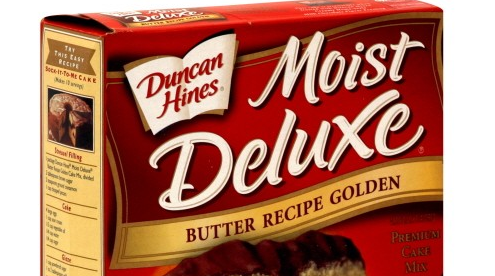A Moist Upsetting Word

According to a 2006 article in USA Today, 64% of Americans admit to using the f-word at least occasionally. (Many of the other 36% were probably lying.) The taboo around the f-word probably exceeds how offended people are by it, but our self-censorship persists — you can’t say it on broadcast television and those of us who write family-friendly email newsletters rarely use it (except for when they’re also the names of towns in Austria). The same is probably true for other similar words — our reluctance to using them in polite company is nice, as there’s no reason to make someone unnecessarily uncomfortable. But it is probably a bit on the extreme side.
The title above, on the other hand, doesn’t contain any swears or expletives in it. But it may make you a bit squeamish. And if it does, don’t worry — you’re not alone. Except when also discussing cake, the word “moist” can be off-putting — according to a 2016 study by Paul H. Thibodeau, a professor of psychology at Oberlin College, 10% to 20% of the population often dislikes the word. That’s far and away worse than any non-expletive. It probably isn’t an exaggeration to say that “moist” has unfavorables which compare to other words which are typically adorned with asterisks or thinly-veiled euphemisms — even though we’d never think of calling it the “m-word,”
What gives?
The phenomenon is called “word aversion” per the New York Times. At first, many experts thought that the aversion was to what the word sounds or looks like, or something triggered by our mouth muscles as we form the word, but that turns out not to be the case. According to Nautilus, “similar-sounding words, such as ‘foist,’ did not generate the same reaction,” and “because those words also put your facial muscles in similar positions, we can also discount the disgust-facial expression theory.” Rather, as Mental Floss explains, “people found the word moist most disgusting when it was accompanied by unrelated, positive words like ‘paradise’, or when it was accompanied by [words that would give it a PG-13 meaning]. By contrast, when it accompanied food words (like ‘cake’), people weren’t as bothered by it.” And, quite tellingly, “the more disgust [respondents] associated with bodily functions, the less they liked [the word] ‘moist’.”
Further, word aversion doesn’t end with the m-word. Slate spoke with Natasha Fedotova, a PhD candidate at the University of Pennsylvania, discussing her research into the power that words have. Specifically, Fedetova was investigating “the extent to which individuals connect the properties of an especially repellent thing to the word that represents it,” something which understandably leads to word aversion. Per Slate: “If you serve people who are grossed out by rats Big Macs on plates that have the word ‘rat’ written on them, some people will be less likely to want to eat the portion of the burger that touched the word.” The words take on magical properties; per Fedeotova, it is “as though they can transfer negative properties through physical contact.”
And to add even more magic, it turns out that such negative properties are contagious. Mic spoke with University of Chicago linguistics professor Jason Riggle, who noted that disgust can spread from person to person: “if you drink too much tequila, the thought of tequila will make you sick. But you can also observe someone else getting sick from something and develop a similar disgust response. Disgust is contagious in that way.” Word-induced disgust, it turns out, are no different. The more one hears that “moist” is a dirty, vile word, Riggle explained, the more likely that person is to conclude that the masses are correct.
So if, after reading this, you are now part of the ten to twenty percent who really don’t like the word “moist,” well, sorry about that.
Bonus fact: We may not like the word “moist,” but bacteria like warm, moist environments, as anyone who has ever used a Petri dish certainly knows. And in public restrooms, that can cause a real problem. Many public restrooms are outfitted with automatic hand dryers which blow warm air at our wet, recently washed hands. In 2014, per the Washington Post, researchers (using harmless bacteria for testing purposes, thankfully), asked test subjects to wash their hands and then dry up in different ways. The results aren’t good for those who like the machines: “bacteria counts were 27 times higher near warm-air dryers than when subjects used paper towels .” The reason? Per ABC Australia, “bacteria were already inside the warm-air dryers, thanks to the warm moist environment” which allowed them to thrive.
From the Archives: Turning of Niagara Falls: The word “moist” makes a surprising (and not at all disgusting) appearance.
